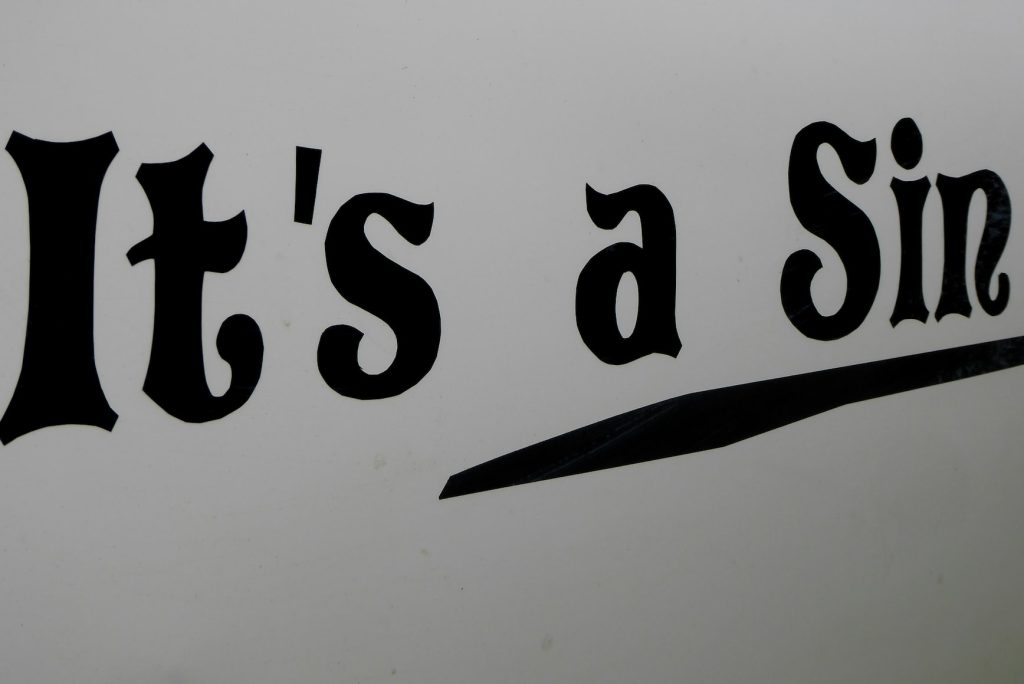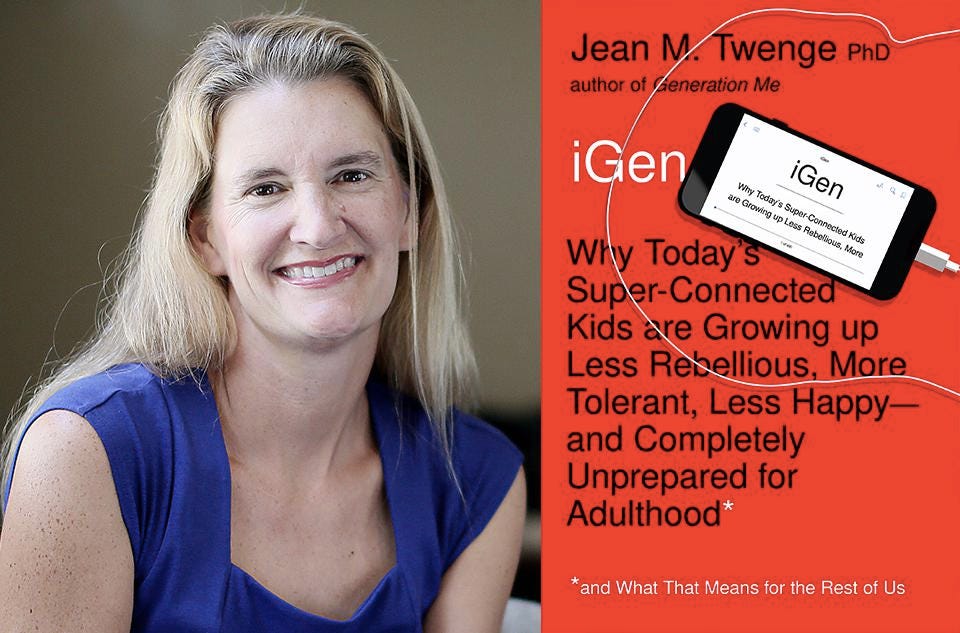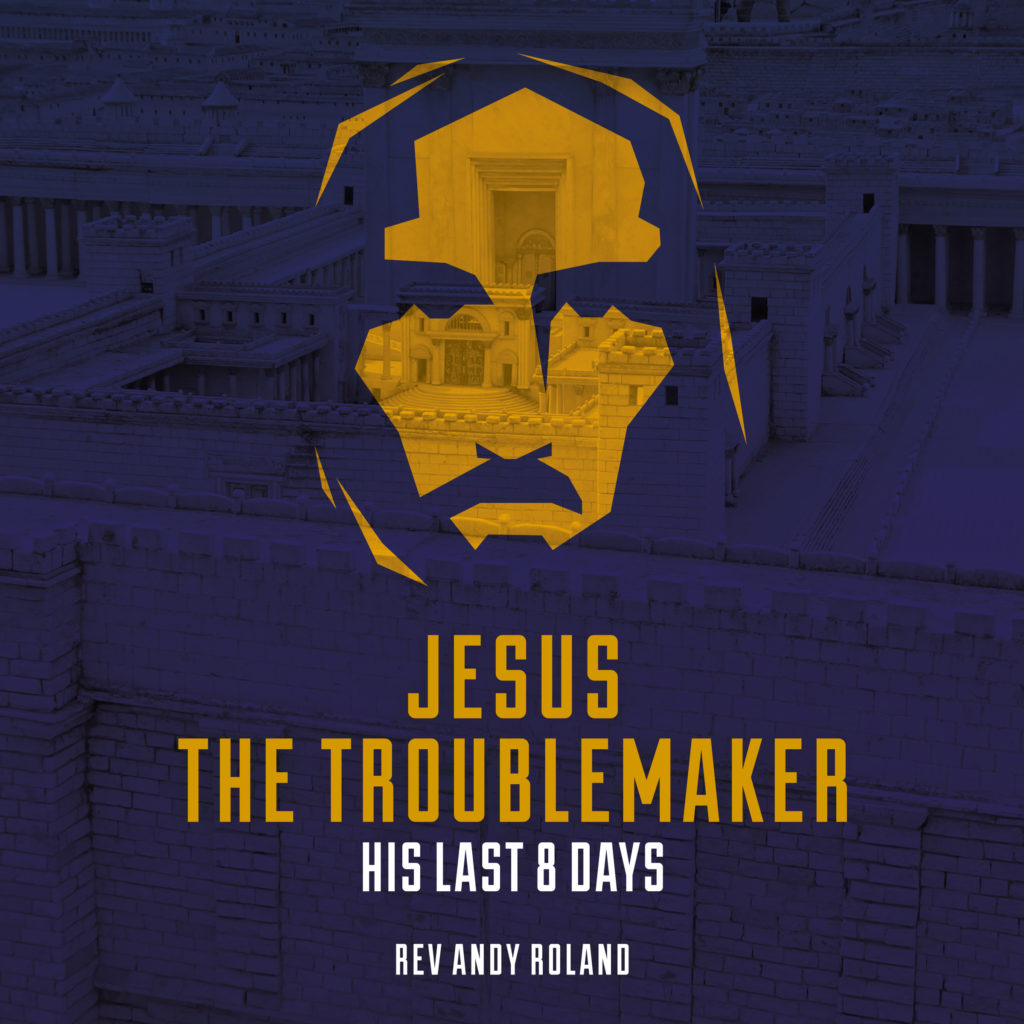As we look around at the world – both the world outside us and the world within us, we may find ourselves confronting not one problem but two: the problem of sin and the problem of good and evil.
THE PROBLEM OF SIN
Does it mean anything?
When Calvin Coolidge, President of the United States 1923 – 1929, returned from church one Sunday morning, his wife asked him what the minister had preached about.
“Sin”, the President said briefly.
“What did he say?”
“He were agin it,” was the laconic reply.

‘Sin’ is a slippery word, which gives colour to statements but not content. If you google quotes on sin, it comes up with things like:
- “There ain’t no sin and there ain’t no virtue. There’s just stuff people do.” – John Steinbeck, the Grapes of Wrath
- “Sin, young man, is when you treat people like things. Including yourself. That’s what sin is.” ― Terry Pratchett, Carpe Jugulum
- “The only sin is the sin of being born” ― Samuel Beckett
In March 2023 I asked three young women in West London what the word conveyed to them. Here are their replies;
- “It’s a very very general word about doing something wrong.”
- “It’s used by Christians and Muslims.”
- “I never use it.”
Sin and the Church
However, the Church talks a lot about sin. The result is some pretty bad news. Here is what one of the most popular saints, St Francis of Assisi, said:
A key component of sin is disobedience to the commandments of God. But this is tricky. Today’s world believe that there’re no universal stories and no universal rules. Even good church-going Christians don’t take seriously commands they don’t like, like not working on a Sunday, the Christian sabbath (Exodus 20.8-11); or giving away all one’s possessions (Luke

In his short theological time-bomb ‘Honest to God’ (1963) Bishop John Robinson denied any final authority to rules or laws, including those written in the Bible. Everything had to be judged in terms of the situation, so-called situation ethics:
‘Nothing can of itself always be labelled as ‘wrong’… This ‘new morality’ is, of course, none other than the old morality, just as the new commandment is the old, yet ever fresh, commandment of love. It is what St Augustine dared to say with his ‘dilige et quod vis fac’, ‘Love, and what you will, do.’… Whatever the pointers of the law to the demands of love, there can for the Christian be no ‘packaged’ moral judgements – for persons are more important than ‘standards‘.’
What can replace rules as a definition of sin? Great theologians like St Augustine and Martin Luther used the expression “the heart curved in on itself,” This tells me that we are all travelling in a spiral, in one of two directions, either moving outward towards greater openness to God and others, or moving in ever-decreasing circles to a point of non-existence.
Sin is a portmanteau word used to cover many words in the Bible. One thesaurus gives about sixty one words as English alternatives to ‘sinfulness’. The most common Hebrew word is ‘khata’ meaning to go astray or to miss the mark. The most common Greek word in the New Testament is ’hamartia’ which means the same but is used in the Bible as a comprehensive expression of everything against God. When I take a service I always use the words ‘failure and rebellion’ instead of ‘sin’. It makes sense to me, and I am afraid to say that I really relate to them.

The Snake and the Apple
From the beginning of the Church, Christians believed that sin originated in the act of disobedience when Adam and Eve ate some fruit from the tree of the knowledge of good and evil, (not necessarily an apple). As a result they were expelled from the Garden of Eden and had to cope with weeds and painful childbirth. Fundamentalist Christians believe that this is actual history. I was leading a Bible discussion on Genesis 3 in my vicarage in Hackbridge, doing the normal mealy-mouthed vicar thing, “Of course no one is sure whether this actually happened or not,” when my six year old step-son piped up, “Oh that’s easy. It’s a parable.” And of course he was quite right.
Michael Ramsey, when he was Archbishop of Canterbury, visited the USA when there was a big dispute within the Episcopal Church about the origin of original sin. As soon as he set foot on the tarmac of JFK airport, a journalist rushed up with the question,
“Archbishop, do you believe in original sin?”
He replied,
“Believe in it? I’ve seen it.”
A neat reply. But only useful if we drill down to actual attitudes and behaviours which can stand in the way of human flourishing.
The Seven Deadly Sins
Round about 2005. the Sun newspaper switched its support of Tony Blair and New Labour with a stinging issue headlined ‘BLAIR’S 7 DEADLY SINS’.

On an inside page it helpfully told us that the famous list of sins was created by a 4th century monk Evagrius of Pontus (345 – 399), who started as a successful cleric in the imperial court of Constantinople and ended as an ascetic monk in the Egyptian desert.
He reduced the number of sins recognised by the monks of Egypt from nine to eight, and two hundred years later Pope Gregory the Great reduced to seven. Here they are:
- Pride (vainglory, vanity)
- Greed
- Lust (fornication)
- Envy
- Gluttony
- Wrath (anger/hatred)
- Sloth
A sin that got dropped was melancholy/depression/despair/ being apathetic.
They are still a useful checklist to work out how we are doing in our daily life and relationships. Whether avoiding them is the pathway to eternal bliss is beyond my pay grade.
Wisdom from the East
The Eastern religions, Hinduism, Buddhism etc., see the human predicament differently. For them the two great stumbling blocks are desire and wrath. As the Bhagavad Gita says,
‘It is greedy desire and wrath, born of passion, the great evil, the sum of destruction: this is the enemy of the soul…Be a warrior and kill desire, the powerful. enemy of the soul.’
(3.37, 43)
The oldest Buddhist writing, the Dhammapada, has this inspiring verse:
‘Hate is not conquered by hate. Hate is conquered by love. This is a law eternal.’ (1.5)
Gen Z
Gen Z, generation Z, also called iGen, are those who have been born after 1995. They have no knowledge of a world without the internet. This shapes a radically different view of morality from that of previous generations.
The following quotations are taken from ‘iGen’ by Jean M Twenge (2017). It is written from the American situation, but is readily applicable to the western world in general.

Here are some quotations for Jean Twenge’s book:
Do your thing
‘In a society where young people hear, ‘If it feels good, do it” and “Believe in yourself”, religion seems almost counter-cultural.’ (P. 138)
‘iGen’ers are just less willing to label anything as “wrong” – it’s all up to the individual. (p. 205)
Tolerance
A key value is tolerance. Kacey Musgrave, 28, a country singer, said “I believe that people should do what they want with their own bodies.” The vast majority of iGen’ers see no reason why two people of the same sex should not marry and are supportive of transgender people. But anyone who asserts something different can face a ‘cancel culture’, where social media is used to deny a platform for their views to someone who goes against the prevailing opinion.
Emotional Safety
A key value for iGen’ers is safety. Not just from physical harm but also from emotional harm or perhaps even emotional discomfort. In March 2016 someone had written ‘Trump 2016 ‘ in chalk on the pavement at Emory University. ‘Some students said the messages made them feel unsafe , and protesters shouted at the college administrators, “You are not listening! Come speak to us, we are in pain!”’ Two out of three SDSU students agreed that “If negative racial incidents occur on a college campus, the president of the university needs to apologise even if he/she did not take part in the incidents.”
A consequence has been increasing restriction on free speech. Three out of four college students agreed with the statement, “If many students disagree with the views of someone who has been invited to speak on campus, the students should create a ‘safe space’ to come to during the speech.” A direct outcome of the stress on emotional safety is the habit of ‘disinviting’ speakers whose views some students find upsetting. In 2015 over 40% of new American students thought that extremist speakers should be banned. Actual disinvitations have included former Secretary of State Condoleeza Rica and the managing director of the International Monetary Fund Christine Lagarde.
Sex and Relationships
Here are some phrases about relationships and sex:
‘At the end of the day your 20s are the years where you do you. Be selfish, have fun and explore the world.’
‘You don’t need someone else to make you happy – you should make yourself happy.’
‘By 2014 more 18 to 34 year olds were living with their parents than with a spouse or romantic partner.’
The ideal sexual experience is to be emotionless, and drunk. One college website offered advice on “How to Avoid Catching Feelings”: “Go into it with the attitude that you’re not going to develop feelings towards this person. Don’t tell them your life story. Don’t cuddle. For the love of God this is a must…. If needed make a barrier of pillows between you. Hey, desperate times call for desperate measures.”
The normalisation of pornography has actually contributed to less sex. One 17 year old who first saw porn when he was nine said, “Pornography, especially on the internet, has desensitised teens into not enjoying or wanting sex or intimacy.” (p. 212). This is borne out by statistics on teenage pregnancy.
Phrases that have triple or quadrupled in books between 1970 and 2008 are:
“Don’t need anyone.” “Never compromise.” “I love me.” (P 214 – 215)
A CONCLUSION
The history of sin has moved through several stages:

- from implicit belief in the reliability of the Bible in laying down rules for living, both in this life and in that to come, as interpreted by the Church;
- To widespread literacy and common ownership of the Bible through the invention of printing, and the setting-up of the Ten Commandments as normative for all Christians;
- To a wider debate on the truth of Christianity and the Bible and its replacement by a natural as opposed to a supernatural basis for morality;
- To the current internet-formed generation where all that counts is personal authenticity.
Does the idea enshrined in ‘sin ‘ only make sense within the framework of an active faith in the One who is beyond and with and within all things?
WHAT’S NEXT
Talks on ‘The `Real Story of Holy Week
what I learnt through writing ‘Jesus the Troublemaker’ as a novel.
Tuesday 28th March 7.30 pm. In-person talk/discussion at St Cuthbert’s church, SW5 9EB 7.30pm with refreshments
https://www.eventbrite.co.uk/e/the-real-story-of-holy-week-online-tickets-558783585747
Monday 3rd April 8.00 pm online talk/discussion https://www.eventbrite.co.uk/e/the-real-story-of-holy-week-online-tickets-558830335577

The next blogs
- Thursday 6th April – Maundy Thursday.- A one-off blog about the Last Supper: “Why did Jesus die – according to Jesus?’
- Friday 14th April Blog on ‘The Problem of Good and Evil.’
